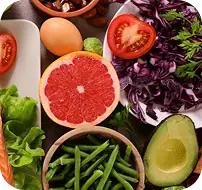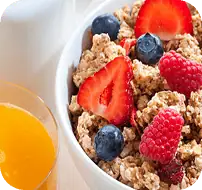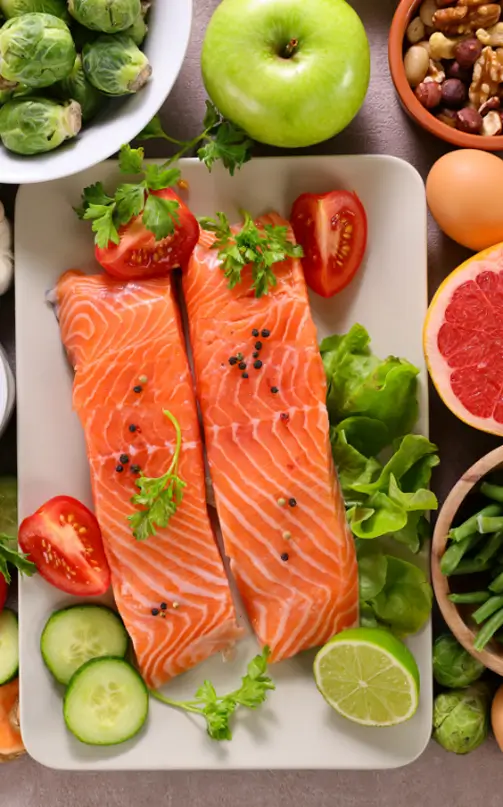Discover how food can be your best medicine in managing chronic diseases like diadetes heart disease, and more.
Proper nutrition is critical in preventing and managing chronic diseases such as diabetes, heart disease, hypertension, and obesity.
A diet rich in vitamins, minerals, antioxidants, and fiber strengthens the immune system, reduces inflammation, and improves overall organ function. Consuming whole foods like fruits, vegetables, whole grains, lean proteins, and healthy fats significantly reduces the risk of chronic diseases. On the contrary, diets high in refined sugars, sodium, and unhealthy fats are linked to the onset and progression of these conditions.
Additionally, maintaining a balanced diet helps control blood sugar levels, manage weight, and reduce harmful fats in the body. By making conscious dietary changes, individuals can not only prevent chronic diseases but also support effective treatment and management. Therefore, a balanced and nutrient-dense diet is essential for both disease prevention and long-term health management.

Anti-inflammatory foods like fruits, vegetables, and spices (such as turmeric) help reduce chronic inflammation, a key factor in many diseases.

Nutrient-dense foods rich in vitamins, minerals, and antioxidants support the immune system, helping the body fight infections and stay healthy.

High-fiber foods like whole grains and vegetables, along with lean proteins, help regulate appetite and support healthy weight management, reducing the risk of obesity-related conditions.

Healthy fats from sources like omega-3-rich fish and nuts help reduce bad cholesterol (LDL), lower blood pressure, and reduce the risk of heart disease.

Anti-inflammatory foods like fruits, vegetables, and spices (such as turmeric) help reduce chronic inflammation, a key factor in many diseases.

Probiotic-rich foods like yogurt, kefir, and fermented vegetables help maintain a healthy gut microbiome, improving digestion and reducing digestive issues.

Certain foods, including dark chocolate, nuts, and green tea, contain mood-boosting compounds that help reduce stress and improve mental health.

Omega-3 fatty acids found in foods like fatty fish and seeds support brain health, improve cognitive function, and reduce the risk of neurodegenerative diseases like Alzheimer’s.

Antioxidant-rich foods such as berries, leafy greens, and cruciferous vegetables help protect cells from oxidative stress and may lower the risk of certain cancers.

Complex carbohydrates, lean proteins, and healthy fats provide sustained energy, improve physical performance, and enhance recovery after exercise.
An anti-inflammatory diet focuses on consuming foods rich in antioxidants, omega-3 fatty acids, and fiber, such as leafy greens, berries, fatty fish, and nuts. These foods help reduce chronic inflammation and promote overall health.
Low glycemic index (GI) foods release glucose slowly into the bloodstream, helping maintain stable blood sugar levels. Examples include whole grains, legumes, non-starchy vegetables, and certain fruits like berries.
Personalized nutrition tailors diet plans based on genetic makeup, lifestyle, and individual health needs to optimize well-being. Factors like metabolism, nutrient absorption, and disease risk are considered to create a diet that suits each person uniquely.
The Mediterranean diet emphasizes plant-based foods, healthy fats like olive oil, whole grains, and lean proteins, promoting heart health and longevity. Combined with an active lifestyle and social meals, it supports overall well-being and reduces chronic disease risk.
Personalized nutrition tailors diet plans based on genetic makeup, lifestyle, and individual health needs to optimize well-being. Factors like metabolism, nutrient absorption, and disease risk are considered to create a diet that suits each person uniquely.
Content: A healthy diet plays a crucial role in managing diabetes, as what you eat directly affects your blood sugar levels. If you use insulin, tracking the carbohydrates in your meals and drinks is essential, as your carb intake influences the amount of insulin needed at mealtimes. Adopting nutritious eating habits can also support weight management and lower your risk of heart disease.
Fiber plays a crucial role in managing diabetes by improving blood sugar control. Consuming fiber, especially soluble fiber, slows down the absorption of sugar and prevents rapid blood sugar spikes after meals. Additionally, fiber enhances insulin sensitivity, helps with weight management, and prevents common digestive issues associated with diabetes. Moreover, fiber aids in lowering LDL (bad) cholesterol levels, reducing the risk of heart disease in people with diabetes. Including fiber-rich foods such as vegetables, fruits, and whole grains in a diabetic diet is essential for better overall health and blood sugar regulation.
Fiber plays a crucial role in managing diabetes by improving blood sugar control. Consuming fiber, especially soluble fiber, slows down the absorption of sugar and prevents rapid blood sugar spikes after meals. Additionally, fiber enhances insulin sensitivity, helps with weight management, and prevents common digestive issues associated with diabetes. Moreover, fiber aids in lowering LDL (bad) cholesterol levels, reducing the risk of heart disease in people with diabetes. Including fiber-rich foods such as vegetables, fruits, and whole grains in a diabetic diet is essential for better overall health and blood sugar regulation.
Fiber plays a crucial role in managing diabetes by improving blood sugar control. Consuming fiber, especially soluble fiber, slows down the absorption of sugar and prevents rapid blood sugar spikes after meals. Additionally, fiber enhances insulin sensitivity, helps with weight management, and prevents common digestive issues associated with diabetes. Moreover, fiber aids in lowering LDL (bad) cholesterol levels, reducing the risk of heart disease in people with diabetes. Including fiber-rich foods such as vegetables, fruits, and whole grains in a diabetic diet is essential for better overall health and blood sugar regulation.

Vegetables: Leafy vegetables (kale, spinach, romaine, swiss chard, collardgreens, cabbage), garlic, onions, peppers (all kinds), leeks, parsnips, potatoes(all kinds), radishes, turnips, squash, green beans, tomatoes, carrots, corn, peas, cauliflower, broccoli, cucumbers, eggplant.
Mushrooms: white button, criminal, portabella, shiitake, oyster, beech, chanterelle, porcini
Fruits: Bananas, apples, kiwi, oranges, blackberries, strawberries, raspberries, blueberries, mango, cantaloupe, watermelon, honeydew, plums, pineapple
Legumes: Black beans, kidney beans, pinto beans, garbanzo beans, cannellini beans, lentils, lima beans, broad beans, soybeans
Whole Grains: Quinoa, brown rice, oats, barley, wild rice, black rice, whole grain tortillas/pasta/breads, couscous, teff, wheat germ
Nuts: Almonds, peanuts, pistachios, cashews, nuts, soy nuts, hazelnuts, walnuts
Seeds: Chia seed, flax seed, hemp seed, pumpkin seed, sunflower seed
is a great way to eat healthier. An example of a positive nutrition goal is, “I will add 1 cup of berries to breakfast and a small apple or orange as an afternoon snack at least five days this week.”



Plan meals, save time, and stay on track with your goals.

Wiser Health helped me take control of my wellness journey. Their expert advice and personalized care made all the difference.

Wiser Health helped me take control of my wellness journey. Their expert advice and personalized care made all the difference.

Wiser Health helped me take control of my wellness journey. Their expert advice and personalized care made all the difference.

Wiser Health helped me take control of my wellness journey. Their expert advice and personalized care made all the difference.


